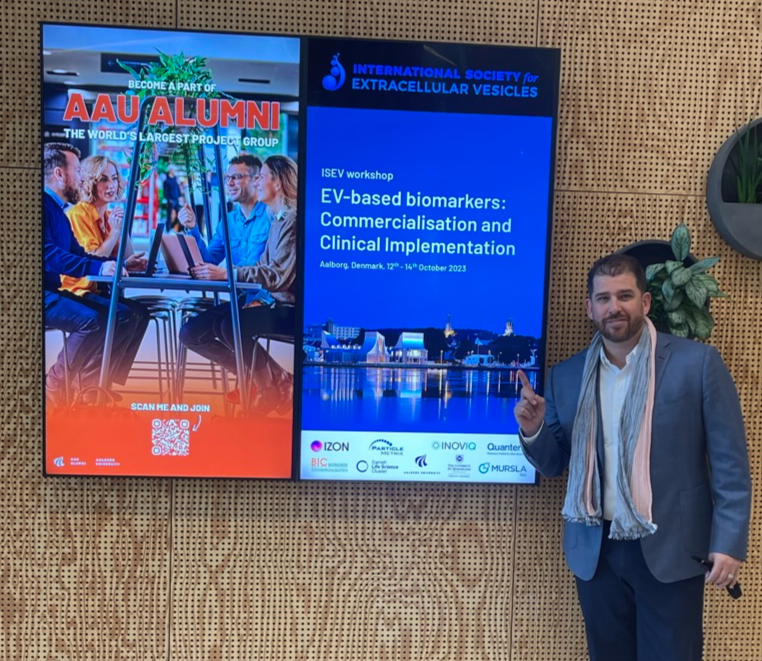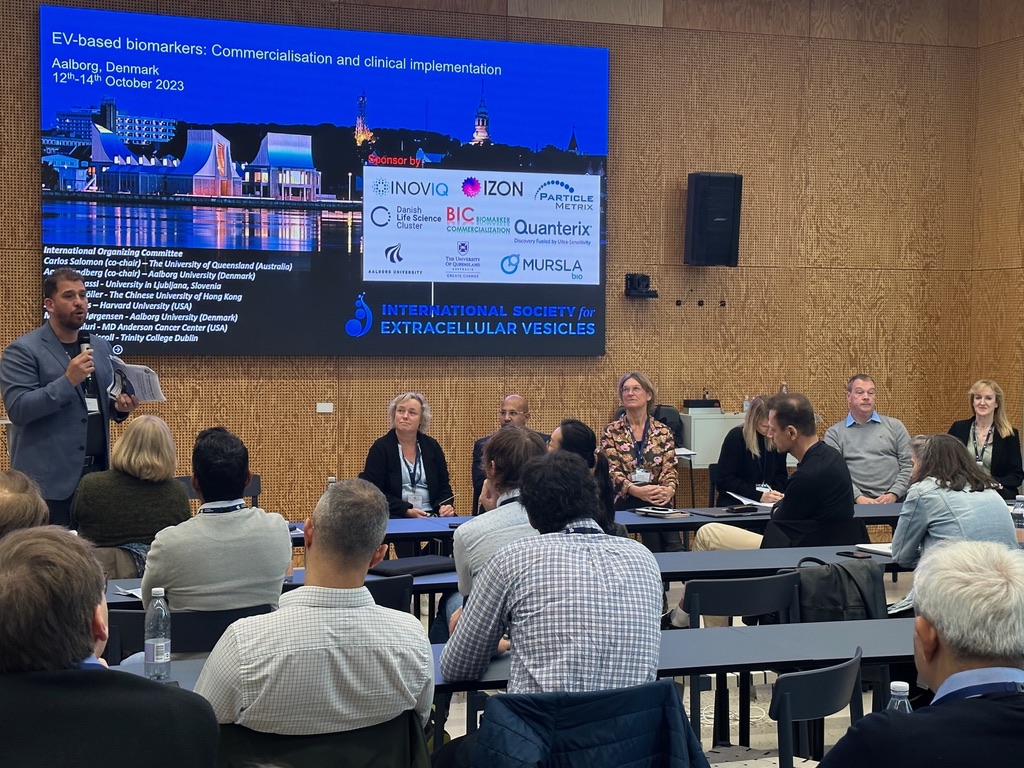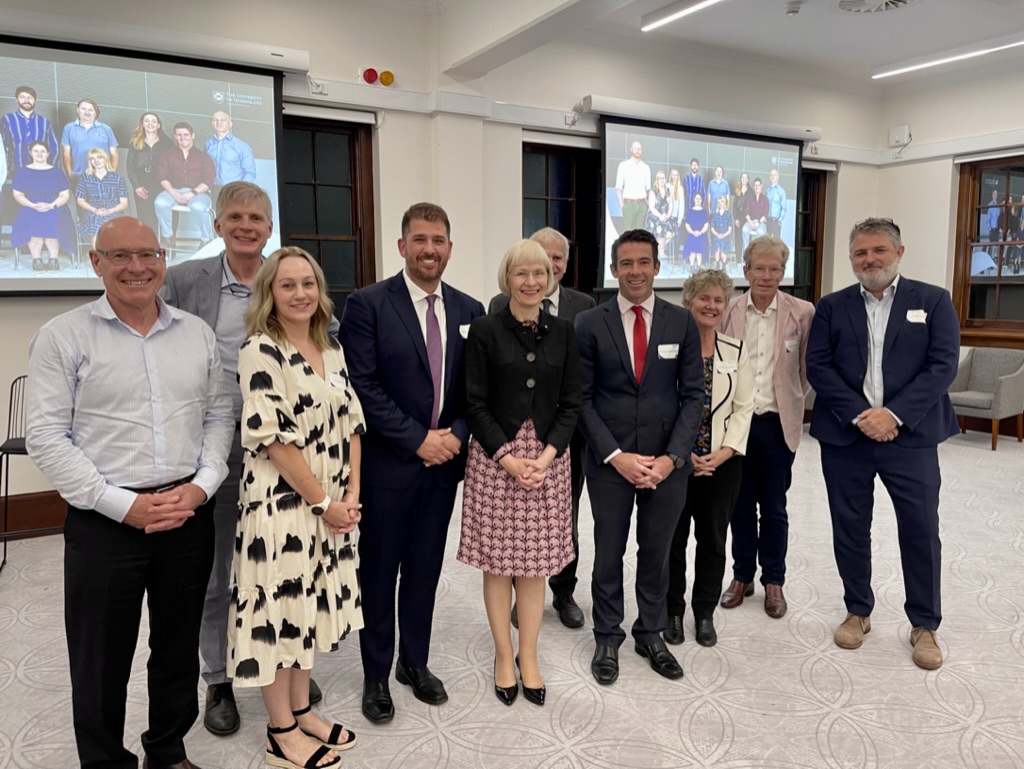Ovarian cancer may be considered rare, but it is still the most lethal gynaecological cancer with only 49% of those who receive a diagnosis expected to survive beyond five years[1]. A historically underfunded disease; ovarian cancer requires a global collaborative effort to increase survival rates.
OCRF-funded researcher Professor Carlos Salomon Gallo, from The University of Queensland, has recently returned home after chairing a research workshop in Denmark and reviewing the progress of his Medical Research Future Fund project. The early detection project is being conducted in collaboration with the Ovarian Cancer Research Foundation and the University College London. He shares his reflections and insights with us.
A snapshot of Professor Salomon Gallo’s Insights:
- Early connections between researchers and industry enables expedited clinical solutions
- Lifesaving research doesn’t occur in a vacuum - global collaboration across sectors is essential
- The value of research projects needn’t be viewed in isolation as one research project can proliferate many more
[Approx. reading time: 4 minutes]
Denmark: Connecting to industry for more feasible ovarian cancer research outcomes
The workshop in Denmark analysed the challenges of successfully taking early detection and diagnostic research from the lab to the clinic. This session, sponsored by the International Society of Extracellular Vesicles, focused on specific potential of extracellular vesicles as biomarkers.
 Image supplied by Professor Salomon Gallo
Image supplied by Professor Salomon Gallo
“Extracellular vesicles are like small bubbles circulating in blood and are produced by cancer cells. They have the extraordinary ability to capture a snapshot of what’s going on inside the tumour. There are molecules inside extracellular vesicles that can indicate the presence of ovarian cancer quite early.”
– Professor Salomon Gallo.
Uniquely, the session brought together a diverse group of researchers, healthcare professionals, academics, and industry experts from across Europe, the USA, and Asia-Pacific regions. Taking a research approach from the lab and transforming it into an ovarian cancer detection test that can be used by doctors anywhere is no easy feat. Each group of representatives at the workshop offered insights from different parts of the clinical translational pipeline. To Professor Salomon Gallo, the discussions highlighted the need to include industry representatives as early as possible, as they can provide practical feedback on whether an early detection approach can be feasibly manufactured, achieve regulatory approval for clinical use, and be able to be produced at scale, so that it can be made accessible to anyone.

The majority of the time what we can do in the lab is not suitable for the clinic. Working with industry is important as they know how to turn the science into the tool that will ultimately help the community."
– Professor Salomon Gallo
 Image supplied by Professor Salomon Gallo
Image supplied by Professor Salomon Gallo
LONDON: THE VALUE OF SHARING INFORMATION, EXPERIENCE AND OVARIAN CANCER SAMPLES
Professor Salomon Gallo then travelled to London where he met with researchers contributing to the development of his early detection test, the OCRF-7 — named in recognition of the Ovarian Cancer Research Foundation’s significant contribution to funding this project in its initial stages. Professor Usha Menon and Dr Aleksandra Gentry-Maharaj are global leaders in ovarian cancer research, working at the Institute of Clinical Trials and Methodology at the Clinical Institute for Women’s Health, University College London. Professor Menon’s team has over 30 years[2] of experience and have conducted large-scale clinical trials including the UK Collaborative Trial of Ovarian Cancer Screening Study (UKCTOCS) and the UK Familial Ovarian Cancer Screening Study (UKFOCSS). They understand new trial techniques and the cutting-edge technology involved.
During the meeting they discussed results of a study containing up to 3,000 patient samples, which was an important validation step for the OCRF-7 biomarker panel and will inform the projects next steps. The samples were initially collected for the UKCTOCS study. Although the UKCTOCS study found that current ovarian cancer detection methods don’t detect the disease early enough to improve ovarian cancer survival rates, conducting the study included collecting samples from over 200,000 women[3] — creating one of the largest collections in the world. Importantly, it collected samples not only from the point of diagnosis, but up to ten years prior to diagnosis. Samples collected up to five years before diagnosis were used for Professor Salomon Gallo’s study.
This collaboration demonstrates that samples from one significant study can feed a host of new research projects like Professor Salomon Gallo’s. It is particularly beneficial as it allows early detection researchers to understand exactly how much earlier their approaches can identify cancer compared to current methods. Essentially, to test how early is early enough to improve survival rates.

You can't just work within Brisbane, that's not going to work. You need a global effort. It's about sharing information."
– Professor Salomon Gallo
While in London, Carlos received a call notifying him that, only a decade after he had finished his PhD, he had achieved successful promotion to Professor — an achievement that prompted a moment of reflection.
“I couldn't be more thankful. This journey has been filled with countless individuals who have supported and guided me along the way. Last Monday, we celebrated the 15th anniversary of the UQ Centre for Clinical Research. I've been here for 10 of those years, and I feel very fortunate to have had a strong and supportive environment at UQ. The support of the OCRF has also been crucial. I received my first funding in 2016, just three years after completing my PhD, and this provided the impetus to develop a promising ovarian cancer research program.”
Professor Salomon Gallo was also awarded The University of Queensland’s UQCCR 2023 Director’s Researcher of the Year Award.
 Image supplied by Professor Salomon Gallo: Professor Salomon with UQ leadership, Professors Deborah Terry (UQ Vice-Chancellor and President), Geoff McColl (Dean Faculty of Medicine, FoM), Karen Moritz (Associate Dean, FoM), Jason Roberts (UQCCR Director), and Mr Michael Walsh, A/Director-General, QLD Health, and formers UQCCR Directors.
Image supplied by Professor Salomon Gallo: Professor Salomon with UQ leadership, Professors Deborah Terry (UQ Vice-Chancellor and President), Geoff McColl (Dean Faculty of Medicine, FoM), Karen Moritz (Associate Dean, FoM), Jason Roberts (UQCCR Director), and Mr Michael Walsh, A/Director-General, QLD Health, and formers UQCCR Directors.
Whether through accessible samples or learning from the experience of others, solutions to ovarian cancer require collaboration from across the globe, sectors, and over time. Although ovarian cancer remains a complex medical mystery, Professor Salomon Gallo’s recent experience is a reminder that today’s research begets excellent future research. Each project is part of a cumulative effort expediting the community towards to lifesaving answers.
While investment is needed across all areas of research, researchers, clinicians
and consumers most frequently identify early detection research as one of the highest
priority areas to improve survival. The OCRF will continue to fund multiple research projects in early detection, until the ovarian cancer 5-year survival rate sits well above the current 49%.
Read more about the OCRF's research priorities.
This article has been reviewed and approved by Professor Carlos Salomon Gallo.
Read more about Professor Salomon Gallo's OCRF-funded research.
References:
[1] Cancer Australia: https://www.canceraustralia.gov.au/cancer-types/ovarian-cancer/statistics
[2] University College London: https://profiles.ucl.ac.uk/8877-usha-menon/about
[3] The Lancet: https://www.thelancet.com/article/S0140-6736(21)00731-5/fulltext